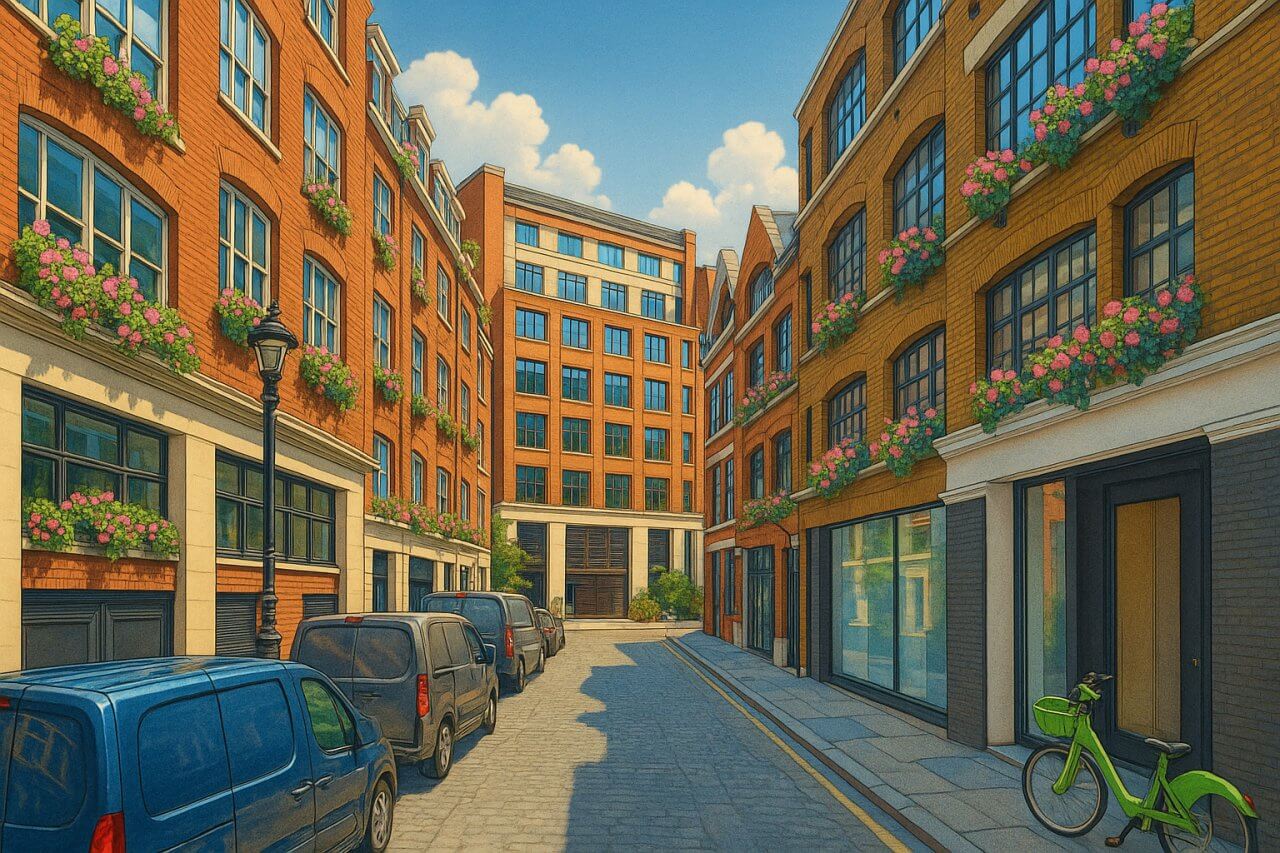
Kean Street, London
Kean Street is a short yet historically rich street in the City of Westminster, forming part of the cultural heart of London. Located within the vibrant West End and the Covent Garden area, Kean Street runs one way from Kemble Street in the northwest to Drury Lane in the southeast. Though only about 100 metres long, it provides a quiet cut-through in a lively area filled with theatres, restaurants, and historic institutions.
Street Layout and Surroundings
Kean Street runs parallel to several other well-known roads in Covent Garden and is closely aligned with Tavistock Street to the south and Wild Street to the north. The street features a mixture of office buildings, older brick townhouses, and small commercial premises, maintaining a modest appearance compared to neighbouring thoroughfares. Pedestrian activity here is moderate, with the street often used as a local connector rather than a destination itself.
Nearby streets include Keeley Street and Russell Street, all of which share similar urban characteristics. The area surrounding Kean Street blends Georgian and Victorian architecture with modern insertions, and the atmosphere is enhanced by the presence of several historic theatres and cultural venues.
History of Kean Street
Kean Street was laid out in the early 19th century as part of the urban expansion and redevelopment of the Covent Garden area. It is believed to have been built circa 1800–1820, during a time of growth in theatre culture and London’s commercial life. Initially lined with residential dwellings and artisan workshops, many of which have since been converted into offices or boutique retail spaces, the street has retained its modest proportions and historic charm.
Origin of the Name
The street is named after Edmund Kean (1787–1833), a renowned English actor who revolutionised Shakespearean performance with his passionate portrayals of roles such as Shylock and Richard III. The name is pronounced as keen /kiːn/, and was likely bestowed on the street to honour Kean’s influence on the theatre district, especially given its proximity to Drury Lane Theatre.
Nearby Attractions and Points of Interest
Kean Street lies within easy walking distance of several major attractions:
- The Theatre Royal Drury Lane, one of London’s oldest theatres, located just around the corner.
- Covent Garden Piazza, known for its open-air performances, shops, and eateries.
- Freemasons' Hall, an Art Deco landmark on Great Queen Street.
- Royal Opera House, just a few minutes’ walk south.
Given its central location, the street is well placed for exploring a wealth of nearby attractions ranging from historic pubs to cutting-edge restaurants and boutique shopping arcades.
Transport Connections
London Underground
The nearest London Underground stations are:
- Covent Garden Station (Piccadilly line) – approximately 4 minutes’ walk.
- Holborn Station (Central and Piccadilly lines) – 6 minutes on foot.
- Temple Station (District and Circle lines) – about 10 minutes' walk, slightly farther south.
Bus Services
The closest bus stops are located on Kingsway and Aldwych. Key routes include:
- Bus 1, 59, 68, 168, and 188 from Kingsway
- Bus RV1 (limited service) from Aldwych for a scenic route through central London
Residential Real Estate
Residential properties on Kean Street are limited, and those that exist tend to be compact apartments located in mixed-use or converted buildings. As of May 2025, flats here average around 600–800 sq ft (56–74 sq m), though larger loft-style units occasionally appear on the market.
- Sale Prices: A one-bedroom flat on Kean Street typically sells for around £850,000 to £1.1 million, depending on the building and condition.
- Rental Prices: Monthly rents for similar properties range from £2,800 to £3,600.
These figures are higher than the London average but typical for prime locations in the West End. Due to its quiet profile and excellent access to the city’s entertainment and transport network, Kean Street is a sought-after address for professionals and investors alike.
Fun Fact
Kean Street was once home to small artisan workshops, including a bindery that was known for producing custom-made theatre programmes for the surrounding playhouses. Today, while most such trades have vanished, echoes of its theatrical past remain embedded in the area’s architecture and culture.
Quick Facts
- Location: Covent Garden, City of Westminster
- Connects: Kemble Street to Drury Lane
- Nearest Tube Stations: Covent Garden (Piccadilly), Holborn (Central, Piccadilly), Temple (District, Circle)
- Named After: Edmund Kean, celebrated Shakespearean actor
- Name Pronunciation: "Keen" /kiːn/
- Nearby Attractions: Theatre Royal Drury Lane, Covent Garden Piazza, Freemasons’ Hall
- Typical Flat Size: 600–800 sq ft (56–74 sq m)
- Sale Price (2025): £850,000–£1.1 million
- Rental Price (2025): £2,800–£3,600 per month
- Nearby Bus Stops: Kingsway, Aldwych
Map of Kean Street, London
 Painting of Kean Street, London
Painting of Kean Street, London